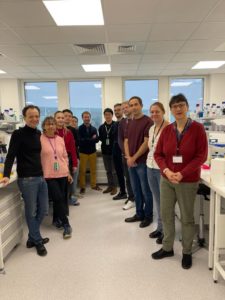Microbiome in liver disease: from susceptibility to treatment
 Our INSERM team, Microbiome in liver disease: from susceptibility to treatment is supervised by Dr. AM. Cassard and is located in the Faculty of Pharmacy at the Paris-Saclay University.
Our INSERM team, Microbiome in liver disease: from susceptibility to treatment is supervised by Dr. AM. Cassard and is located in the Faculty of Pharmacy at the Paris-Saclay University.
Our research focus on the two main chronic liver diseases: non-alcoholic fatty liver disease renamed MASLD and alcoholic liver disease (MASLD and ALD).
We strive to understand how overweight and alcohol trigger the development and progression of these diseases with a particular emphasis on the role of the microbiome.
Our lab’s research is a joint effort of clinician-researchers and basic science researchers and led to major discoveries including the causal role of the microbiome in MASLD and in the individual susceptibility to develop ALD. More recently, we showed that modulating the microbiome can alleviate ALD.
The team has been labeled by the French Foundation for Medical Research. GP and AMC wrote a book for the general public on intestinal microbiota in 2017 entitled « Les bactéries, des amies qui vous veulent du bien » which means « With friends like bacteria ». They received the prize « la science se livre » for the best educational publication of the year.
Together, they have developed the team and research projects by a straight relationship between basic and clinical research. The Team moved in 2022 with the INSERM U996 in the new building of the Faculty of Pharmacy of Paris-Saclay University.
Our current projects
- Role of the intestinal microbiota in ALD and the development of new therapeutic approaches
- Developing new probiotics to treat alcohol use disorder
- Role of intestinal microbiota in alcohol abuse
- Roles of intestinal microbiota and lipids in MASLD
- Role of Enterococcus faecalis in the worsening of chronic liver disease
- Development of new formulations: impact on the gut microbiota and gut homeostasis
Positions available
If you are interested in a post-doctoral position in our lab, please a detailed CV and a motivation letter to cassard.doulcier@universite-paris-saclay.fr
Publications of the team since 2016

Perlemuter is a Professor of Hepatology and Gastroenterology (PU-PH) and heads the Department of Hepato-gastroenterology and Nutrition at Antoine-Béclère University Hospital (Clamart, France) and at Paris-Saclay Hospital (Opening June 2024). He is a member of the French National Academy of Medicine. GP is world-renowned with expertise in nutritional liver diseases (ie liver diseases related to alcohol and overweight/obesity) and in the interactions between the microbiome and the liver. GP co-leads the INSERM research team “Microbiome in liver disease: from susceptibility to treatment”. GP is the author of numerous scientific and educational publications. He is involved in the supervision of many MD and PhD students. GP received in 2017 a prize from the French National Academy of Medicine for his fight against alcoholism. GP is regularly invited to give national and international lectures. He is also regularly invited by the French media (TV, radio, newspapers).
A-M. Cassard (Doulcier) co-leads the team “Microbiome in liver disease: from susceptibility to treatment” at INSERM, Paris-Saclay University. AM Cassard obtained her PhD in endocrinology at Paris-South University (France). During her PhD and after her recruitment at INSERM, she focused on molecular mechanisms regulating the transcription of uncoupling protein 1, expressed in brown adipose tissue, then the role of an uncoupling protein 2 expressed in macrophage during inflammation. She joined G. Perlemuter to study nutritional liver disease and addressed the role of lipid and glucocorticoid-induced leucine zipper (GILZ) in Kupffer cells and the role of CXCR4 in lymphocyte recruitment in NAFLD. Since 2007, she has developed topics focused on the role of intestinal microbiota in nutritional disease, particularly demonstrating the causal role of the intestinal microbiota in non-alcoholic fatty liver disease and alcoholic liver disease. She currently manages projects showing that prebiotics or specific bacteria isolated from patients could be protective against alcoholic liver disease.
